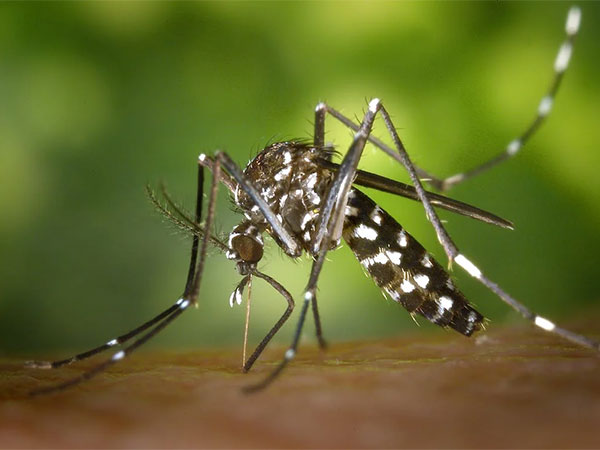

The mosquito”>female mosquito will hunt down any person, although some of us experience significantly more bites than others. Our skin could hold the key to understanding why.
This is the reason Vosshall and Maria Elena De Obaldia, a former postdoc in her lab, decided to investigate the top theory to account for differences in mosquito attraction: personal odour variations linked to skin microbiota. In a recent study, it was shown that the strong scent produced by skin-emanating fatty acids may be what repels mosquitoes. Their findings were reported in Cell.
“There’s a very, very strong association between having large quantities of these fatty acids on your skin and being a mosquito magnet,” says Vosshall, the Robin Chemers Neustein Professor at The Rockefeller University and Chief Scientific Officer of the Howard Hughes Medical Institute.
Eight individuals were requested to wear nylon stockings over their forearms for six hours each day for the duration of the three-year trial. They went through this process several times. The nylons were pitted against one another in all conceivable pairings throughout the course of the following several years in a round-robin type “tournament.”
De Obaldia created a two-choice olfactometer test for them, which consisted of a plexiglass chamber split into two tubes, each of which ended in a box holding a stocking. In the main room, they positioned Aedes Aegypti mosquitoes, which are the principal carriers of Zika, dengue, yellow fever, and chikungunya. They watched as the insects flew down the tubes in either the direction of one nylon or the other.
Subject 33 was by far the most alluring target for Aedes aegypti, attracting the mosquitoes 100 times more than Subject 19, who was the least attractive research participant, and four times more than the next most alluring subject.
The trial samples were de-identified, so the researchers had no way of knowing which individual had donned which nylon. In any study involving Subject 33, however, they would realize that something was off because insects would flock to that sample. De Obaldia claims that it would become clear shortly after the test began. As a scientist, this is the kind of stuff that truly excites me. This is a genuine situation. This is not a case of nitpicking. It has a significant impact.
The subjects were divided into high and low attractors, and the researchers then inquired as to what made each group unique. 50 molecular components that were higher in the sebum (a moisturizing barrier on the skin) of the very attractive individuals were found using chemical analysis techniques.
This led them to the conclusion that mosquito-magnets”>mosquito magnets generated carboxylic acids at substantially higher amounts than the less attractive participants. Our distinct human body odor is created by bacteria on our skin using ingredients found in the sebum.
Vosshall’s team recruited an additional 56 participants for a validation study to validate their findings. Subject 33 continued to be the most intriguing subject throughout time.
“Some subjects were in the study for several years, and we saw that if they were a mosquito magnet, they remained a mosquito magnet,” says De Obaldia. “Many things could have changed about the subject or their behaviours over that time, but this was a very stable property of the person.”
Mosquitoes have two distinct sets of olfactory receptors, known as Orco and IR receptors, which they use to detect primarily two groups of human scents.
The researchers developed mutants lacking one or both of the receptors to explore whether they might make mosquitoes that were unable to detect people. While IR mutants lost their attraction to us to varying degrees but still had the capacity to locate us, Orco mutants continued to be drawn to humans and were able to distinguish between mosquito-magnets”>mosquito magnets and low attractors.
The scientists had not anticipated these findings. “The objective was to create a mosquito that would no longer be attracted to humans or a mosquito with a weaker attraction to everyone and the inability to distinguish between Subject 19 and Subject 33. That would be fantastic, adds Vosshall, as it would encourage the creation of more potent insecticides. “But we didn’t actually see that. It made me angry.”
These results complement one of Vosshall’s recent studies, also published in Cell, which revealed the redundancy of Aedes aegypti’s exquisitely complex olfactory system. It’s a failsafe that the mosquito”>female mosquito relies on to live and reproduce. Without blood, she can’t do either. That’s why “she has a backup plan and a backup plan and a backup plan and is tuned to these differences in the skin chemistry of the people she goes after,” Vosshall says.
It is challenging to imagine a world in which humans are not the main course on the menu due to the mosquito scent tracker’s seeming unbreakability. However, altering the microbiomes on our skin is one option. It’s likely that applying sebum and skin bacteria from the skin of a low-appeal person, like Subject 19, to the skin of a high-appeal person, like Subject 33, might have the effect of hiding mosquitoes.
“We haven’t done that experiment,” Vosshall notes. “That’s a hard experiment. But if that were to work, then you could imagine that by having a dietary or microbiome intervention where you put bacteria on the skin that are able to somehow change how they interact with the sebum, then you could convert someone like Subject 33 into Subject 19. But that’s all very speculative.”
It’s impossible to imagine a world in which humans aren’t the most popular dish on the menu given the mosquito smell tracker‘s seeming impenetrability. However, altering our skin’s microbiota is one option. It’s feasible to have a mosquito-masking effect by applying sebum and skin bacteria from the skin of a low-appeal person, like Subject 19, to the skin of a high-appeal person, like Subject 33.